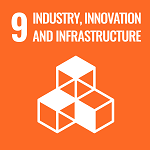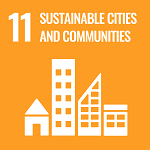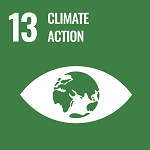Sustainability
Sustainability

|
Sustainability in general, and climate change and biodiversity in particular, are among the largest challenges our society face. We at MST address sustainability both through our research and through our education. |
Research addressing sustainability challenges
Our micro- and nanostructures and sensors form a base for (1) better medicine; (2) automation in industry and transport, and; (3) environmental sensing and monitoring.
We address the following UN Sustainable Development Goals:

|
Roughly half of our research is life science and medicine related, with specific focus on basic disease mechanisms and diagnostics and therapy of infectious diseases, cancer, and diseases of the nervous system. |

|
We have several projects on beyond-5G telecommunication, all in the sub-THz frequency spectrum, in particular on high-data rate point-to-point communication networks for future network infrastructure. We have several remote-sensing projects exploiting THz frequencies, including a national project on space-borne earth observation environmental sensors. |

|
We have several projects on sub-THz radar sensors for road safety, including traditional car radar but also emerging radar applications such as in-cabin monitoring and critical-road crossings surveillance. |

|
Photonic CO2 sensors for environmental sensing and monitoring; next-generation space-borne sub-THz frequency radiometers for environmental sensing, atmospheric chemistry missions and weather satellites. |

|
We are engaged in a project to develop plant-based sensors. |
Education addressing sustainability challenges
The following PhD-level courses address aspects of sustainability
- FEK3250 Microsystem Technology for PhD Students
- FEK3360 Advanced Hands-on MEMS Course
- FJQ3100 - FJQ3105 Micro and Nanotechnology Journal Club I-VI
- FJQ3320 Micro and Nanosystems - applied technologies outside the cleanroom
- FEO3120 From research to Impact
Contact
If you have specific questions about sustainability at MST, please contact Deputy Department Head Wouter van der Wijngaart .
